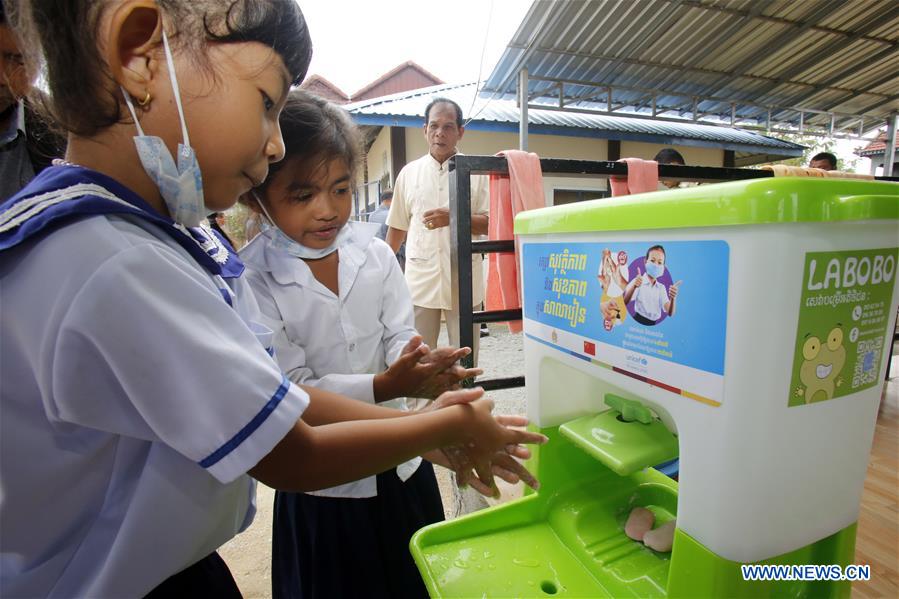China provides hygiene supplies to pre-schools in Cambodia, benefiting 70,000 pupils

Children wash their hands at a China-donated portable handwashing facility at the Trapeang Thlan Village community pre-school in Prek Pnov district, Phnom Penh, Cambodia on Oct. 21, 2020. China, through the United Nations Children's Fund (UNICEF), has provided hygiene and learning supplies to 3,064 community pre-schools across Cambodia, allowing some 70,000 children to return to school safely, with better protection from the COVID-19. (Photo by Sovannara/Xinhua)
China, through the United Nations Children's Fund (UNICEF), has provided hygiene and learning supplies to 3,064 community pre-schools across Cambodia, allowing some 70,000 children to return to school safely, with better protection from the COVID-19.
The symbolic handing over of these supplies to community pre-schools were held at the Prek Pnov district's education office in northern suburb of Phnom Penh on Wednesday.
Speaking at the event, Wu Guoquan, economic and commercial counselor of the Chinese Embassy to Cambodia, said China actively participates in global anti-pandemic cooperation, firmly supports multilateralism, and fully backs the leading role of the United Nations in the fight against the epidemic.
"These supplies are a cooperation between the Chinese government, UNICEF and the Cambodian government...to support and care for the healthy development of Cambodian children, and to improve the ability of Cambodian communities and schools to respond to the pandemic," he said.
Cambodian Education Ministry secretary of state Kim Sethany said Cambodia welcomed the provision of these supplies and thanked China for working with UNICEF to support Cambodia's pre-school children.
She said the provision of teaching and learning materials and WASH (water, sanitation and hygiene) supplies, such as portable handwashing facilities, water filters and cleaning products, is essential for the safety and health of the youngest learners.
"The ministry wants as many young children as possible to benefit from attending pre-school, and this is only possible when learning environments are safe," she said. "We hope families will feel reassured in sending their children to pre-school as a result of this critical support."
Foroogh Foyozat, UNICEF representative in Cambodia, said China has been a key supporter of the Cambodian government and UNICEF in their joint response to the COVID-19 crisis.
She said early childhood education plays a foundational role in a child's development, improving their educational results in later school years and leading to better outcomes in their adult lives.
"We are very grateful that China's Ministry of Commerce is investing in early childhood education, allowing Cambodian children to access pre-school education safely," she said.
"As the Cambodian education system recovers from and increases its resilience to the COVID-19 crisis, we will continue to work together to reimagine the provision of early education for every Cambodian child, especially the most vulnerable ones," she added.
After the ceremonial handing over of materials to pre-school teachers, the delegation travelled to Trapeang Thlan Village community pre-school in Prek Pnov district to observe how the hygiene and learning supplies are being used by the pre-school's personnel and students.
Im Nan, a 40-year-old teacher at the Trapeang Thlan Village community pre-school, said the supplies are very useful to help protect pupils against the COVID-19 and to encourage them to practice good hygiene.
"The materials donated to my school include carbon papers, colour papers, pencils, colour pens and correction pens among others, as well as hygiene supplies including two portable handwashing facilities, water filters and cleaning products," she told Xinhua. "This aid has enabled us to protect them not only from the COVID-19, but also from other infectious diseases."
Nan said during the COVID-19, students are required to wear face masks and to wash hands frequently with gel and soap, which are also provided by China via the UNICEF.
The Southeast Asian nation has so far recorded a total of 286 confirmed COVID-19 cases, the Ministry of Health said, adding that none have died and 280 have recovered.